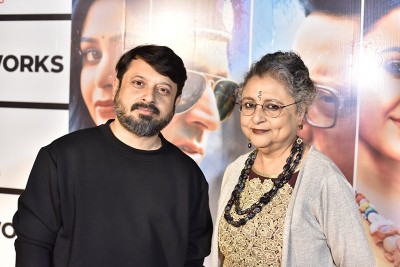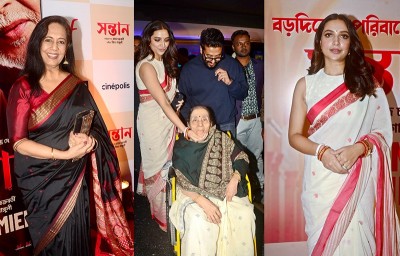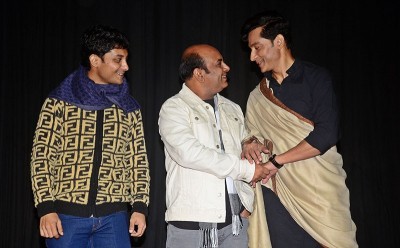
We wanted to present a fair portrait of Warren Anderson: Martin Sheen
The director, Ravi Kumar, tells us that when he went to you with Bhopal: A Prayer for Rain, you went out of your way to be a part of the film...
Yes, I'm old enough to remember the tragic incident. It's been 30 years now. There have been many documentaries around the incident but this was going to be the first drama. As often as the phrase "based on a true story" is used, this is actually 100 per cent true. There are two world events that had equal kind of devastation on innocent people — Bhopal in 1984 and Chernobyl just two years later. Those two incidents live in our memory. Young people may have heard about them. They know something about it, but they do not know the specifics. I think this film makes it possible for them to look back at what happened and make sure it doesn't happen again. That's the main thing. There's nothing we can do about what happened. The biggest contribution we can make is create awareness and if young people want to become involved in environmental studies, that would be wonderful.
But you were to play the guy said to be responsible for the disaster, Warren Anderson...
My main concern was that we did not just rash judge Anderson. But he did not offer any defence. We couldn't contact him. He's been out of public view since the incident. He's still under criminal indictment in India. We wanted to present a fair portrait of him. We didn't just want to say that he is a scoundrel or a villain. But he represented the company that was the villain. And both the Indian and the American companies of Union Carbide were responsible. Warren Anderson was the one image in the world. He was protected by our government. (Ronald) Reagan made sure that he got out. The Indian government — Rajiv Gandhi was the Prime Minister then — made sure he got out. And he has never surfaced since. We invited him to participate, to give us some facts, to come forward, to have his say. But no. I think he lives up in Connecticut somewhere. The only picture of him Martin Sheen as Warren Anderson in Bhopal: A Prayer for Rain There are two world events that had equal kind of devastation on innocent people — Bhopal in 1984 and Chernobyl just two years later. Those two incidents live in our memory. Young people may have heard about them. They know something about it, but they do not know the specifics. I think this film makes it possible for them to look back at what happened and make sure it doesn't happen again in the last three years is when someone knocked at his door and took a photograph. That's it.
So how do you create a character who exists in real life but you don't have access to?
I had to trust the material we had. And we felt we were under the obligation to defend him if he were to defend himself. We felt we not only had the responsibility but the right to present his point of view. We know he had a great sense of charm. He wanted everyone to relate to the company on a very human level. He wanted to be respected and admired in the community for making a contribution. He was a very good public relations man. He wasn't there by accident. There's one scene with the reporter in the car where Anderson is very clear that he believes Union Carbide is actually saving lives, providing employment to the poor communities and that it's a good thing for India. It's a fair business. He is morally cognisant. It's a moral frame of reference he works in.
But then when the disaster does take place, Anderson becomes a different man altogether...
No, he never apologised. He never went public to say: 'My god! My god! What have we done! How can we repair? What can I do? I offer myself'. No! '11D give him credit he did go back to India to estimate the damage but when he realised that there was a warrant for him, he took off. That was not a brave thing to do. There were sure a lot of legal things at stake. If he would have admitted his mistake, the corporate shield would have come down. He never tried to make right this horrible, horrible wrong. That is where we had to find him. He did not come forward. He was complacent in his silence. He was an embarrassment for our country. And yet he was very typical of so much of corporate America... the Wall Street scandals, the bank scandals, investment scandals. None of them ever apologised. On the contrary they got huge exit fees. Morally they were all absolutely repugnant.
You shot in India for Bhopal... 25 years after you shot for Gandhi, in which you played Walker the journalist. Any memories of that shoot?
I was in Delhi, Porbandar and what was called Bombay then. We filmed in those three cities. India awakened a consciousness within me, a moral consciousness, which was nurtured subsequently. It was the awakening to my own personal journey which led me to Catholicism. I wanted to lead an honest life. I wanted to be responsible. And India was the key. I had not seen poverty like that before and yet the humanity.. you can't forget all that. It ignited a desire in me to lead an honest life and it culminated in Paris, where I had gone to do a film after Gandhi. I was given to play this man (Captain Willard) who took other people's lives for a living. And we had defined the vulnerability, the brokenness, the humanity in him.... So I decided to go into that area within me that was troubled and insecure and frightened. And just explore those demons. Francis (Ford Coppola) tried to stop it because it was all improvised. But I said, no, just keep it going. It was a very, very deeply personal, painful journey.
Badlands with Terrence Malick?
Yes, yes (smiles).
You are still synonymous with Apocalypse Now's Captain Willard, specifically that iconic opening scene. Does that make you happy or do you think that undermines your other work?
I don't know. As actors, we are given to reflect the human condition. And I was given to play this man who took other people's lives for a living. He was a professional assassin. And we had defined the vulnerability, the brokenness, the humanity in him. Killing another person affects someone in a deeply personal way, whatever be the reasons. So I decided to go into that area within me that was troubled and insecure and frightened. And just explore those I was in Delhi, Porbandar and what was called Bombay then. We filmed (Gandhi in which he played Walker) in those three cities. India awakened a consciousness within me, a moral consciousness.... it was the awakening to my own personal journey which led me to Catholicism. I wanted to lead an honest life. I wanted to be responsible. And India was the key demons. That's the only way I could relate to the character I was playing. I was alcoholic and I was drinking at that time very heavily. And that's when very often the worst comes out. I was like, let's go there... let's see what happens. I had wrestled the demons before but never on film. And Francis (Ford Coppola) tried to stop it because it was all improvised. But I said, no, just keep it going. It was a very, very deeply personal, painful journey.
Was it difficult for you to see yourself like that on screen?
I never saw the rushes, I never wanted to see it forever. Neither Francis nor I knew if that scene would make it to the movie. Because we didn't know what we had. Until the film was put together, it was just an improvised sequence. When the rushes were sent to him from Rome, he said you should see this. And! said I will never see it. I have no interest in it. It's yours... 1 did it... it doesn't belong to me anymore. I chose to go there and what you choose to do with it is your business. Now, it did not appear in the film when it premiered in Cannes in the summer of '79. It wasn't there. I was relieved in a way. And when the film opened, I couldn't attend the opening because I was working on some other film. Then I heard that scene was in there. I was very reluctant to see the movie. I saw the film a couple of weeks later, with a regular crowd here in New York. I couldn't stop weeping. I felt so vulnerable. I had no regrets. I embraced it. It was two years later and I thought to myself that was Who I was, that's not who I am now You have to let it go. It had a very powerful effect, particularly on veterans. The film was not well received when we opened. The critics were not crazy about it. The veterans began to see it and they were like, yes that's what it was like. The Vietnam vets gave us credibility and that began the success of the film.
And you have just done another very personal film, The Way, written and directed by your son Emilio Estevez...
You must see it. It's the best work 1 have done. I promise you. Emilio wrote it for me and he directed it. He also plays my son in the film. Many people have seen the film and have gone and done the pilgrimage. It is the story of a man who walks the historical pilgrimage — The Way of St James — to honour his son's desire to finish the journey. There was a lot of interest among producers but they wanted a big star, not me. Like a Michael Douglas or a Harrison Ford. But Emilio said, no, I wrote this for my old man. So, we did it ourselves. And you must see this film. With your family.
Support Our Journalism
We cannot do without you.. your contribution supports unbiased journalism
IBNS is not driven by any ism- not wokeism, not racism, not skewed secularism, not hyper right-wing or left liberal ideals, nor by any hardline religious beliefs or hyper nationalism. We want to serve you good old objective news, as they are. We do not judge or preach. We let people decide for themselves. We only try to present factual and well-sourced news.







